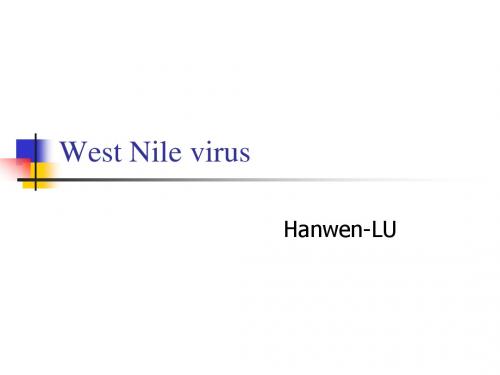预防西尼罗河病毒感染(中英文对照)
- 格式:ppt
- 大小:832.00 KB
- 文档页数:14


防止传染病毒传播英语作文1. Stay at home and avoid unnecessary outings. It's crucial to limit our contact with others to prevent the spread of the virus. By staying at home, we can reduce the chances of coming into contact with infected individuals and lower the risk of getting infected ourselves.2. Wash your hands frequently and thoroughly. Proper handwashing is one of the most effective ways to prevent the transmission of viruses. Use soap and water, and scrub your hands for at least 20 seconds. Remember to wash all parts of your hands, including the palms, back, fingers, and nails. This simple act can help eliminate any potential viruses on your hands.3. Wear a mask when going out in public. Wearing a mask can provide an additional layer of protection against respiratory droplets that may contain the virus. It not only helps to prevent you from inhaling the virus but also reduces the risk of spreading it to others if you areinfected but asymptomatic.4. Practice social distancing. Keep a safe distance ofat least 1 meter (3 feet) from others, especially if they are coughing, sneezing, or not wearing a mask. Avoid crowded places and gatherings where maintaining distance may be challenging. Social distancing is an effective measure to reduce the chances of coming into contact with the virus.5. Avoid touching your face, especially your eyes, nose, and mouth. Our hands come into contact with varioussurfaces throughout the day, and if contaminated, they can transfer the virus to these entry points. By avoiding touching our face, we can minimize the risk of introducing the virus into our bodies.6. Clean and disinfect frequently-touched surfaces regularly. Surfaces such as doorknobs, light switches, mobile phones, and keyboards can harbor the virus.Regularly cleaning and disinfecting these surfaces can help eliminate any potential viruses and reduce the risk oftransmission through contact.7. Stay informed and follow the guidelines provided by health authorities. Stay updated on the latest information and guidelines from reputable sources such as the World Health Organization (WHO) and local health authorities. By staying informed and following the recommended practices, we can contribute to the collective effort of preventing the spread of infectious diseases.8. Take care of your overall health and boost your immune system. A strong immune system can help fight off infections more effectively. Maintain a balanced diet, exercise regularly, get enough sleep, and manage stress levels. These lifestyle factors can help support your immune system and overall well-being.9. If you experience any symptoms or have been in close contact with someone who tested positive for the virus, seek medical advice and follow the instructions given by healthcare professionals. Early detection, testing, and appropriate medical care are crucial in preventing thefurther spread of the virus.10. Stay positive and support each other during these challenging times. Remember that we are all in this together, and our collective efforts can make a difference in preventing the spread of infectious diseases. Show empathy, kindness, and understanding towards others, and together we can overcome this global health crisis.。

输血前8项感染性指标的检测以及临床意义输血是一项常见且必要的医疗措施,能够解决一些严重的,伴随着贫血、出血性休克等疾病的问题。
然而,由于血液是一个高度复杂的组织,输血也带来了一定的风险,其中最大的风险之一就是输血后的感染。
因此,检测输血前8项感染性指标,能够帮助医务人员及时发现血液中存在的感染源,防止输血后发生感染,并保证受血者的生命安全。
1. 乙肝病毒表面抗原(HBsAg):HBsAg阳性意味着受血者感染了乙肝病毒,存在肝功能受损、肝硬化、肝癌等严重危害。
输血时,必须使用HBsAg阴性血液,避免感染的发生。
2. 丙肝病毒抗体(HCV-Ab):HCV-Ab阳性表示受血者被感染了丙肝病毒,丙肝是一种慢性病毒性肝炎,可导致肝硬化、肝癌等疾病。
输血时,如果受血者HCV-Ab阳性,则必须确认病毒负载情况,并从HCV-Ab阴性的献血者中选取血液输注。
3. 艾滋病毒抗体(HIV-Ab):HIV-Ab阳性意味着受血者感染了艾滋病毒,艾滋病毒是一种致命的病毒,对免疫系统造成破坏,严重危及身体健康。
输血时,必须使用HIV-Ab阴性血液,避免病毒的传播。
4. 梅毒螺旋体抗体(TP-Ab):TP-Ab阳性说明受血者感染了梅毒螺旋体,梅毒是一种病原微生物性疾病,可影响全身器官,甚至危及生命。
输血前必须进行TP-Ab检测,如果TP-Ab阳性,则不能进行输血。
5. 狂犬病毒抗体(RV-Ab):RV-Ab检测对于多次输血的受血者非常重要,如果RV-Ab 阳性,意味着受血者被感染了狂犬病毒,狂犬病毒是一种致命的病毒性疾病,传染性强,严重威胁人类健康。
输血前必须进行RV-Ab检测,确保受血者的生命安全。
6. 西尼罗河病毒抗体(WNV-Ab):WNV-Ab阳性表示受血者感染了西尼罗河病毒,这是由蚊子传播的一种病毒,可导致人类、马、鸟等动物感染,而且有时会导致严重的神经系统疾病。
输血前必须进行WNV-Ab检测,以避免病毒的传播。
8. 常规细菌培养:常规细菌培养是一种常用的检测方法,能够检测细菌的存在并进行进一步的鉴定。


西尼罗河病毒西尼罗河病毒及其致病性西尼罗河病毒于1937年首次发现于乌干达西尼罗河地区, 是从当地一位发热女患者的血液中分离出来的。
1957年, 以色列一些老年人因感染这种病毒而引发脑膜炎或脑脊髓炎。
直到1999 年, 西尼罗河病毒才首次出现于北美。
2001年~2002 年夏季,美国出现了由西尼罗河病毒所致的西尼罗河热流行。
近年来, 西尼罗河病毒多出现于欧洲、北美、中东等气候温和的地区( 南北纬23. 5 度~66. 5度之间) 。
西尼罗河病毒是一种虫媒病毒,属于黄病毒科, 与乙型脑炎病毒等在抗原方面有着密切的关系。
此病毒可以感染人、马、鸟、蚊子和其他动物, 引发致命性的脑炎。
西尼罗河病毒沿着“鸟` 蚊` 鸟”途径维持在自然界的循环, 鸟类是西尼罗河病毒的扩散宿主,蚊子(尤其是库蚊) 是其主要传播媒介,携带西尼罗河病毒的蚊子叮咬人体是本病的自然传播途径。
但也有人认为家庭饲养动物是感染西尼罗河病毒的一个危险因素。
西尼罗河病毒感染后的潜伏期通常是3 d~14 d。
所有居住在西尼罗河病毒活跃地区的居民都可能感染该病毒,年龄超过50 岁的人属于患病后可能出现严重症状的高危人群。
大多数西尼罗河病毒感染者没有典型症状,据估算,只有20%的感染者会出现西尼罗河热(由于感染西尼罗河病毒引起的发热现象) 及其他诸如头痛、身体疼痛、四肢皮疹、淋巴腺肿胀等较轻微的症状。
轻度症状一般持续几天时间, 严重的患者( 患脑炎或脑膜炎)会出现包括头痛、高烧、颈项强直、定向障碍、昏迷、震颤、抽搐、肌无力及瘫痪等症状, 重度症状一般将持续几个星期,偶有死亡。
据估计, 重症患者与病毒感染者的比例是1∶150。
美国输血界采取措施防止输血传播西尼罗河病毒据美国疾病控制中心统计,从1999 年~2001 年, 美国共有149例因感染西尼罗河病毒而致病,其中18 例死亡。
2002 年,又有3 775 例感染西尼罗河病毒。
2002 年以前, 人们认为此病只能通过携带西尼罗河病毒的蚊子传播, 但科学家们通过大量调查发现,此病也可以通过血液进行传播。

怎么防范病毒来袭英语作文英文:As we all know, viruses can be a serious threat to our health, and it's important to take steps to prevent them from spreading. There are a few key ways to protect ourselves from viruses.Firstly, it's important to practice good hygiene. This means washing our hands regularly with soap and water, especially before eating or touching our face. It's also important to cover our mouths and noses when we cough or sneeze, either with a tissue or our elbow.Secondly, it's important to avoid close contact with people who are sick. This means staying home when we're feeling unwell, and avoiding crowded places where viruses can easily spread.Thirdly, it's important to keep our living spaces cleanand disinfected. This means regularly cleaning surfacesthat are frequently touched, such as doorknobs, light switches, and countertops.In addition to these measures, it's also important to prioritize our health by eating well, getting enough sleep, and staying active. A healthy immune system is better equipped to fight off viruses.In conclusion, preventing viruses from spreading requires a combination of good hygiene, avoiding close contact with sick individuals, and keeping our living spaces clean. By taking these steps, we can protect ourselves and others from illness.中文:众所周知,病毒对我们的健康构成严重威胁,因此防范病毒的传播至关重要。